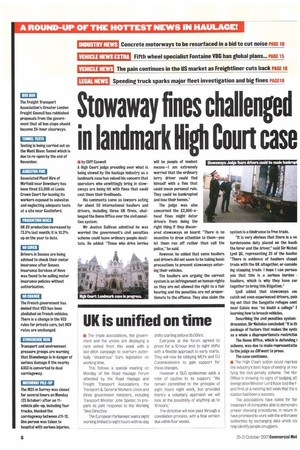Stowaway fines challenged in landmark High Court case
Page 6

If you've noticed an error in this article please click here to report it so we can fix it.
ii by Cliff Caswell
A High Court judge presiding over what is being viewed by the haulage industry as a landmark case has voiced his concern that operators who unwittingly bring in stowaways are being hit with fines that could cost them their livelihoods,
His comments came as lawyers acting for about 50 international hauliers and drivers, including three UK firms, challenged the Home Office over the civil penalties system.
Mr Justice Sullivan admitted he was worried the government's civil penalties scheme could leave ordinary people destitute. He added: "Those who drive lorries will be people of modest means—I am extremely worried that the ordinary lorry driver could find himself with a tine that could mean personal ruin. They could be bankrupted and lose their homes."
The judge was also concerned the £2,000-ahead fines might deter drivers from doing the right thing if they discovered stowaways on board: "There is no incentive to draw attention to them—you let them run off rather than call the police," he said.
However, he added that some hauliers and drivers did not seem to be taking basic precautions to prevent stowaways entering their vehicles.
The hauliers are arguing the current system is an infringement on human rights as they are not allowed the right to a fair hearing and the penalties are not proportionate to the offence. They also claim the system is a hindrance to free trade.
"It is very obvious that there is a ye burdensome duty placed on the haulii the hirer and the driver," said Sir Nichol: Lyell QC, representing 25 of the haulier "There is evidence of hauliers stappil trade with the UK altogether, or conside ing stopping trade. I hope I can persual you that this is a serious burden I haulier's, which is why they have con together to bring this litigation," Lyell added that stowaways cou catch out even experienced drivers, pain ing out that the Sangatte refugee cent near Calais was no doubt a college" f learning how to breach vehicles.
Describing the civil penalties system draconian, Sir Nicholas concluded: It is th package of factors that makes the syste as a whole a disproportionate restrictiol The Home Office, which is defending i scheme, was due to make representatio to the judge as CMwent to press.
The case continues.
• The High Court action could repress the industry's best hope of ending or mu tying the civil penalty scheme. The Hor Office is showIng no signs of budging aft Immigration Minister Lord Rook told the F and FIFIA at a meeting last week that the 1E islation had been a success.
The associations have called for fair treatment of companies able to demonstr proper checking procedures. In return th have premised to work with the entrcems authorities by exchanglng data which col help identify people smugglers.












































































































































